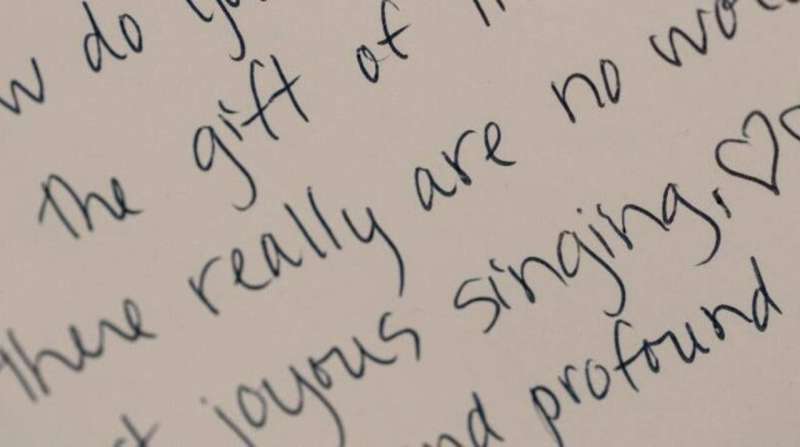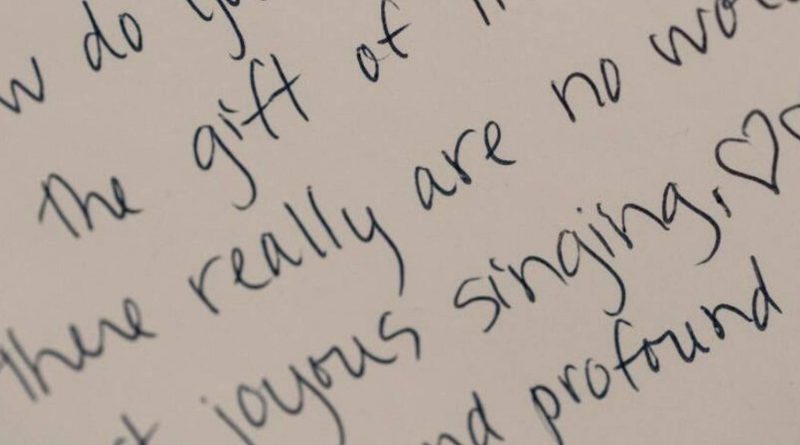Skip the angry, never-sent letter: Try a never-sent grateful one instead

It’s long been said that writing an angry letter—but not mailing it—is an effective way of venting without backlash. UC Riverside researchers say the converse—penning letters-never-sent expressing gratitude—carries a benefit, as well.
There is an entire area of study in psychology devoted to gratitude, including its benefits and how to practice it. Gratitude, in terms of psychology research, is the acknowledgment of a kindness or benefit from another person. Research has identified expressing gratitude as one of the most successful happiness strategies.
Gratitude journaling became a widespread practice during the COVID-19 pandemic. In two studies published this fall, UC Riverside researchers looked at the benefits of such journals and other expressions of gratitude.
In the first study, published in The Journal of Positive Psychology, researchers in Sonja Lyubomirsky’s Positive Activities and Well-Being Laboratory found the most beneficial technique was writing a gratitude letter that would not be shared.
Letter-writers derived more benefit than study participants who expressed gratitude in other ways, including with daily gratitude journals or lists of people and things for which one is grateful. Letter-writers felt more gratitude, positive emotions, elevation, and felt more connected.
“We found that those who wrote gratitude letters reported greater positive emotions relative to controls, along with the unique benefit of feeling more elevated, or, feeling uplifted by the actions of another person,” said lead study author Annie Regan, a graduate student in Lyubomirsky’s lab. “This suggests that reflecting on gratitude to another person serves to upregulate or increase positive emotions.”
An example of a gratitude letter from the study:
Dear Mom,
I am so grateful to have you around as I [navigate] being an adult. It is so good having someone to talk to about all of my little worries in life. I know that we have not always been open in showing our feelings towards each [other], but one comment you recently made to me has struck in straight in the heart. You said to me that my children were relaxed because I’m a good mom. Hearing those words from you meant everything to me. Thank you. I carry that comment deep in my heart and think about it when I’m feeling stressed at home.
I love you, mom xox
Longer-form writing (e.g. gratitude letters) was more beneficial than writing gratitude lists (e.g., counting blessings), the researchers found in the study of 958 adults. The study also found writing a gratitude letter to a specific person, and about any topic they wanted, led to the greatest well-being.
“This study demonstrates that not only does gratitude ‘work’ to boost well-being relative to an active neutral activity, but that some forms of gratitude may be more effective than others,” the authors wrote in the study, recently published in the journal Affective Science.
The second study considered gratitude letters—again, not sent—comparing the letters to thank-you text messages or social media posts that would be shared. Nine hundred and sixteen undergraduate students participated in the recently published study, which looked at whether the method of expressing gratitude yields different effects.
Regardless of the method they used, study participants reported greater positive emotions, satisfaction with life, connectedness, and less loneliness.
But the greatest effect came from texting one-on-one, manifested in reports of increased social connectedness. The texting participants had been instructed to “use your smartphone to text someone who has done something for which you are extremely grateful, and thank them for their kind act(s).”
“The present study shows that digital gratitude interventions helped meaningfully improve students’ well-being—making students feel happier and more satisfied with their lives, as well as more socially connected and less lonely,” the study authors wrote.
More information:
Lisa C. Walsh et al, The role of actors, targets, and witnesses: Examining gratitude exchanges in a social context, The Journal of Positive Psychology (2022). DOI: 10.1080/17439760.2021.1991449
Source: Read Full Article



